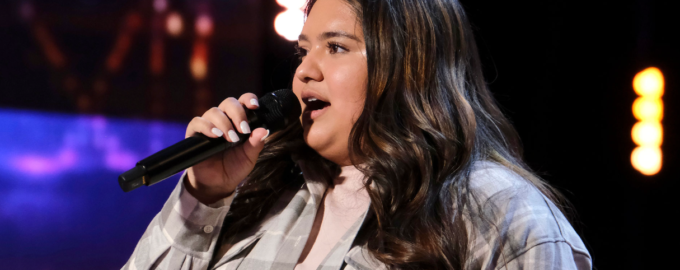Marisol clutched the microphone stand as if it were a lifeline. The bright stage lights bathed her small frame, magnifying every quiver of nerves. She stepped forward, trembling like a leaf in the wind, and the murmur of the audience grew into a ripple of laughter. It wasn’t mean-spirited—just dismissive, the kind that whispers, “What’s she doing here?” Her pale hands gripped the mic stand tighter, knuckles whitening.
She was a late addition to the annual talent showcase, a small-town event filled with confident dancers, booming instrumentals, and polished presentations. Marisol had no illusions—she wasn’t a performer. She had agreed to come at the urging of her music teacher, who insisted a shy voice with heart could outshine any stage presence.
The laughter washed over her, suffocating. Voices whispered: too timid, too unprepared, too… small. But Marisol closed her eyes and breathed deeply, finding solace in the silence behind her eyelids.
Something within her stirred—a pulse of determination, subtle but resolute. She lifted her chin and stepped closer to the mic. Her voice emerged softly but impeccably, cutting through the laughter with crystalline purity.
She sang a folk lullaby, hers to weave not with technique, but with emotion. Every note told stories of childhood memories beneath oak trees, of sunrise waking dewdrops, of lullabies whispered by her grandmother. The melody flooded the hall, and where laughter once thrived, awed silence took its place.
Eyes widened. Phones paused in mid-recording. In just a few breaths, Marisol transformed the auditorium’s mood entirely.

Their attention became her stage.
Wave after wave, she built the song with gentle crescendos and hushed tones, letting her soulful voice carry the weight of honesty. She didn’t need decoration—her voice held the audience captive in its fragility and power.
When she ended with a delicate final note that lingered like a soft echo, the silence stretched long. Then applause unfurled—slow, steady, deep, built from rediscovered hope and surprise. Marisol opened her eyes, seeing faces transformed from skepticism to wonder. And tears glowed in her own eyes.
Before the show, Marisol had arrived in a simple floral dress, arms wrapped in insecurity. Her mother hovered in the wings, proud but anxious, whispering, “You can do this. We’re proud of you.” Yet even as the crowd laughed, Marisol felt that knowing voice guiding her forward.
When she finished, her teacher, Mrs. Hernandez, rushed backstage and hugged her tightly. “You did that,” she whispered. “You shared your heart.”
Marisol exhaled, her breath finally free.
In the days that followed, video clips of that fragile yet fearless performance spread across social media. Comments flowed in:
– “This is what courage looks like.”
– “She didn’t just sing—she awakened our hearts.”
– “Timid girl? More like a gentle storm.”
Marisol’s small-town life shifted. Invitations came for local radio shows, invitations to larger stages. Yet she remained grounded—nervous, but alive.
One week later, a local charity asked her to return to that same stage—this time, with an audience of elderly survivors who longed for comfort in song. Marisol arrived, trembling in the wings as they called her name. At first, she hesitated—nostalgia erupted, beckoning her back to that fearful moment. But her grandmother’s voice echoed in her heart: Sing for those who cannot. She stepped forward once more.
Her opening note wove through the room, bringing smiles, tears, quiet nods. When the song ended, an old woman with trembling hands approached. “Your voice… it reminded me of home.”
And there, in a humble gymnasium filled with fragile bodies and closed eyes, Marisol learned that her voice could cross distances—between generation, memory, loneliness, and healing.
That evening, her family gathered around as she walked in, gentle smile breaking through fatigue.
“What will you sing next?” her mother asked softly.
Marisol placed a hand over her heart. “Whatever needs to be heard.”
Months later, Marisol graduated high school and accepted a scholarship to a regional conservatory. She carried that childhood lullaby in her heart, and every stage held the echo of nervous breath and silencing revelation.
Each time she stepped forward into the light, she reminded herself: strength isn’t always bold—it’s the courage to step up when your voice shakes.
And in each performance, audiences leaned forward, remembering why silence stillness, and voices built from tenderness, can leave the most lasting mark.
